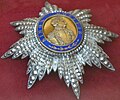This article needs additional citations for verification .(October 2018) |
| Order of the Liberator | |
|---|---|
 Grand Cross of the Order of the Liberator Simón Bolívar | |
| Awarded by the Bolivarian Republic of Venezuela | |
| Type | Order |
| Country | |
| Status | Awarded until 2010 |
| Grades | Grand Collar Grand Cordon Grand Officer Commander Officer Knight |
| Ribbon bar of the Order of the Liberator | |
The Order of the Liberator was the highest distinction of Venezuela and was appointed for services to the country, outstanding merit and benefits made to the community. For Venezuelans the order ranks first in the order of precedence from other orders, national and foreign.
Contents
The President of Venezuela is the Chief of the Order and has the faculty of appointing. By right, he wears the Collar of the Order.
The order was created by Antonio Guzmán Blanco on September 14, 1880, and reformed in 1922 under the presidential term of Juan Vicente Gómez, the Order has as precedent the Medal of Distinction with the bust of the Liberator created on March 11, 1854 under the presidency of José Gregorio Monagas and before that, the Order of the Liberators created by Simón Bolívar in 1813.
In 2010, the National Assembly of Venezuela decided to officially abolish the order and replace it with the Order of the Liberators of Venezuela. [1]














